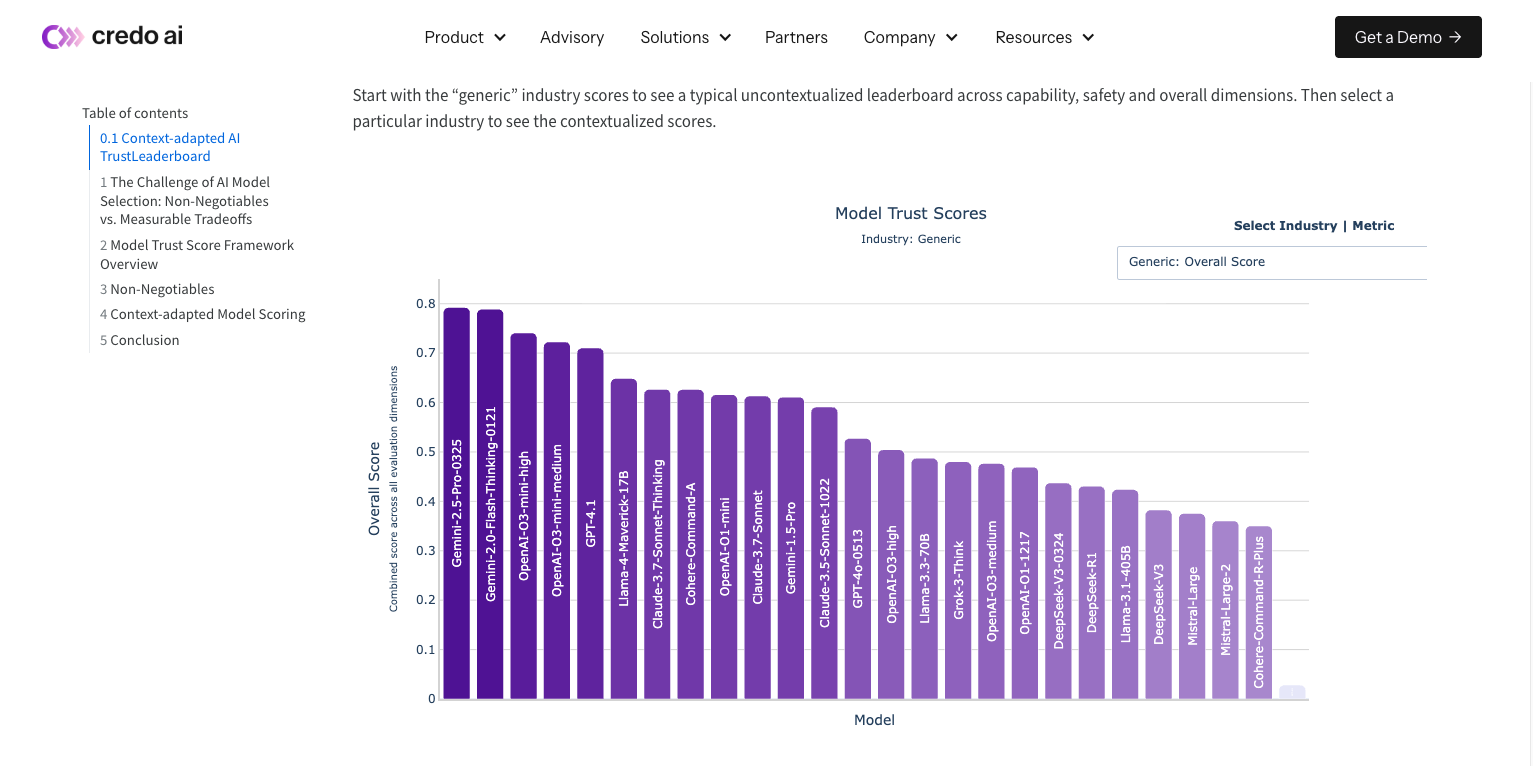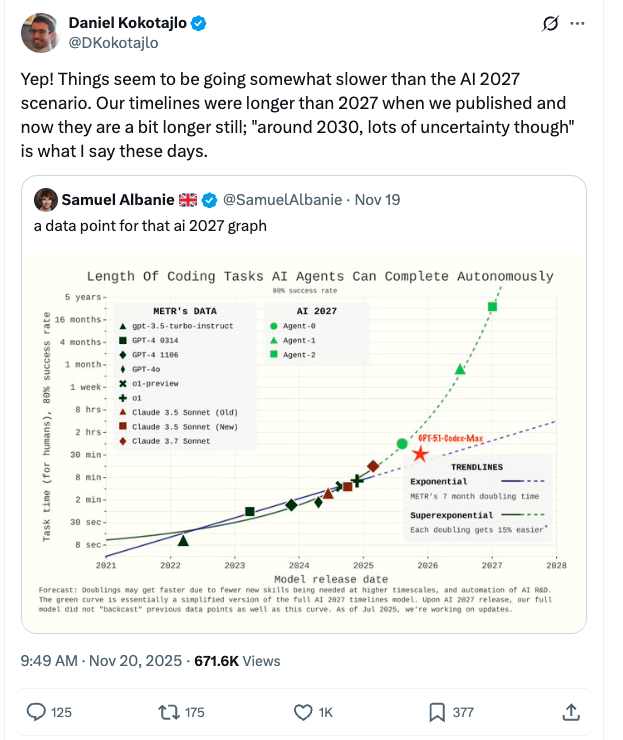Ever try to pick the perfect AI model for your business? It's like shopping for a car but the salesperson only tells you the top speed—helpful if you're racing, useless if you need to haul groceries, pick up kids, or stay within your gas budget.
Sure, that Ferrari looks shiny, but what happens when you discover it guzzles premium gas at $8 a gallon?
Well, Credo AI recently launched Model Trust Scores—the first use-case-based AI model leaderboard that helps enterprises pick models that won't crash and burn.

Their system evaluates 39 leading AI models (including GPT-4o, Llama 3.1, and DeepSeek v3) across 95 different use cases in 21 industries.
It's basically Consumer Reports for enterprise AI, but with fewer crash test dummies (unless you count the executives who've been burned by bad AI decisions).
Not All Benchmarks Are Created Equal
The problem with traditional AI model evaluation? Too many benchmarks that don't account for business context. As Singh put it, “Well, there are so many benchmarks, which can I trust, and are they useful? Enterprises need clarity.”
Credo AI's Model Trust Scores works by creating a stack ranking based on two critical components:
First, the non-negotiables:
- Security requirements.
- Compliance standards.
- Infrastructure compatibility.
Then, the tradeoff analysis:
- Capability: Can it perform the required tasks?
- Safety: Does it avoid bias and legal risks?
- Affordability: Will it bankrupt you?
- Speed: How fast can it deliver?
This addresses the critical issue many companies face: “Is this compliant? Will it meet my business needs? Will it bring the productivity I'm looking for? Is accuracy even the right measure?”
The Highway Metaphor
This balanced approach solves what Credo AI calls the “last mile problem” in AI governance—connecting theoretical best practices to real-world business applications.
They have the perfect analogy for understanding AI governance: think of it like highway management.
“You want all the cars going as fast as possible, but the freeway infrastructure needs protection,” Credo AI CEO Navrina Singh explained to us at the HumanX conference: “Massive trucks get diverted to weigh stations, and you can't have Ferraris doing 200mph either. You need high bandwidth with the right guardrails in place.”
See, different AI applications need different levels of oversight:
- High-risk use cases (like insurance claims processing) = Semi trucks that need careful inspection.
- Low-risk applications (like marketing email chatbots) = Compact cars that can zip along with fewer restrictions.
- Everything in between = Needs appropriate guardrails based on risk level.
Three Buckets of Risk (Spoiler: They're All Important)
Credo AI categorizes AI risks into three buckets:
- Inherent known risks: The usual suspects—fairness problems, adversarial attacks, etc.
- Third-party application risks: Issues that come with models you buy/license from others, whether from open source or proprietary models.
- Emergent properties/unknown unknowns: The what on earth is it doing now? category
These categories help prioritize where to focus your governance efforts. For high-risk scenarios like insurance claims processing, “you will always have human-in-the-loop oversight,” Singh emphasized.
But for low-risk applications like email marketing chatbots, you might not need the same level of review.
A Tale of Two Governance Levels
The company's approach addresses governance at two critical levels:
- Foundation model level: Evaluating base models on their inherent capabilities and risks.
- Application level: Assessing how models perform in specific use cases.
This dual approach helps companies like Mastercard navigate complex decisions when buying AI capabilities from providers like OpenAI, Anthropic, or smaller specialized vendors, for example.
Trust as Currency, Governance as Moat
While Credo AI primarily serves enterprises (financial services, pharma, and government sectors), they make a compelling case for why everyone should care:
- For enterprises: Comprehensive governance across your AI portfolio.
- For SMBs: “Trust can be your currency” even if you lack scale.
- For startups: “Governance can be a moat” for entering regulated markets that helps them launch trusted applications in new sectors.
There’s increasingly compelling evidence that we’re entering the “early majority” stage of the adoption curve for AI tools. So using trust as a competitive advantage can pay off in an increasingly crowded AI landscape when everyone is looking for products they can actually trust at scale.
From Sandboxes to Scale
On that note, according to Credo AI, we're seeing a shift from companies piloting 1-2 AI use cases in sandboxes to scaling up across organizations. This is particularly important in healthcare, where historical ML systems have shown troubling bias issues.
Singh cited Optum as an example: “Old ML systems had black and brown bias…With life insurance claims powered by AI, accuracy and performance are important, but you can't just ignore demographics.”
Vendor Registries, or the Enterprise App Store for AI…
The registry provides transparency about the true cost-benefit tradeoffs between different AI options, from capability to compliance.
One practical implementation of Model Trust Scores is through vendor registries, which function like an enterprise app store for AI models.
The example Singh gave went like this: “Let's say they want to use Gemini. They go through Credo's vendor registry and already see it as an approved vendor.”
This addresses the common enterprise question: “Why can't we use open source and save X percent?” By providing comprehensive trust scores, companies can make informed decisions about the true cost-benefit trade-offs.
The power of well-governed AI can create virtuous cycles at scale. Think about Airbnb: “Airbnb can tell if you're going to throw a party for your 18th birthday,” Singh noted—a capability that protects hosts, improves the platform, and builds user trust simultaneously.
Why This Matters:
As AI capabilities accelerate (92% of companies plan to increase gen AI investments in the next three years, according to McKinsey), but maturity lags (only 1% believe their investments have reached maturity) the risks of getting it wrong multiply—from compliance violations to reputational damage to lost productivity.
Solutions like Credo AI's Model Trust Scores fill a critical gap. Credo AI's approach treats governance not as a brake on innovation but as a necessary guardrail that actually enables faster, safer progress. Their Model Trust Scores provide the missing context layer between raw benchmarks and business reality.
If you're an enterprise planning to deploy AI (who isn't these days?), the ability to evaluate models based on your specific use case, risk profile, and industry could save you from the AI equivalent of buying a Ferrari when you needed a pickup truck. Or worse: doing nothing at all.
After all, if you can’t deploy it, it’s not really useful, is it?
Credo AI also recently announced new advisory services and partner program (30+ partners include IBM, Microsoft, etc.).
Our Take
The days of treating all AI models as interchangeable commodities are over. Just as you wouldn't buy a car based solely on horsepower, enterprises shouldn't select AI models based only on benchmark scores. Context matters, trade-offs matter, and with the right governance framework, you can have both speed and safety on your AI highway.
Just watch out for those Ferrari salesmen who promise their model can do everything. They're probably not telling you about the maintenance costs.







